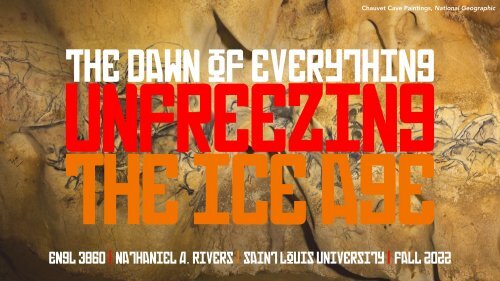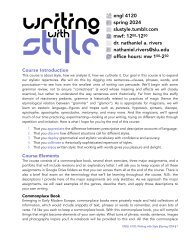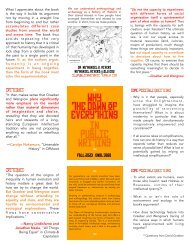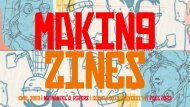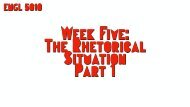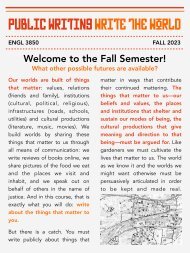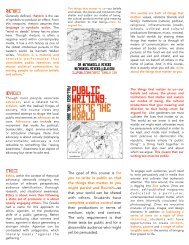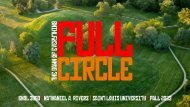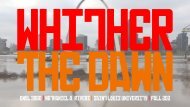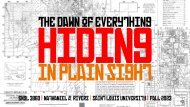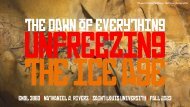ENGL 3860: Unfreezing the Ice Age (FA22)
You also want an ePaper? Increase the reach of your titles
YUMPU automatically turns print PDFs into web optimized ePapers that Google loves.
Chauvet Cave Paintings, National Geographic<br />
The dawn of everything<br />
<strong>Unfreezing</strong><br />
The ice age<br />
<strong>ENGL</strong> <strong>3860</strong> | Nathaniel A. Rivers | saint louis university | fall 2022
For most of our evolutionary history, we did indeed live in Africa—but not<br />
just <strong>the</strong> eastern savannahs, as previously thought […] Some of those<br />
populations remained isolated from each ano<strong>the</strong>r for tens or even hundreds<br />
of thousands of years, cut off from <strong>the</strong>ir nearest relatives by deserts and<br />
rainforests. Strong regional traits developed. The result probably would<br />
have struck a modern observer as something more akin to a world<br />
inhabited by hobbits, giants and elves than anything we have direct<br />
experience of today, or in <strong>the</strong> more recent past. Those elements that make<br />
up modern humans—<strong>the</strong> relatively uniform “us” referred to above—<br />
seem only to have come toge<strong>the</strong>r quite late in <strong>the</strong> process.<br />
Graeber and Wengrow | The Dawn of Everything | 81
What evolution does not look like.
What evolution might look like.
They were far, far more physically diverse than<br />
humans are today; and presumably <strong>the</strong>ir social<br />
differences were even greater than <strong>the</strong>ir physical<br />
ones. In o<strong>the</strong>r words, <strong>the</strong>re is no ‘original’ form of<br />
human society.<br />
Graeber and Wengrow | The Dawn of Everything | 82
We have to picture our ancestors moving between relatively<br />
enclosed environments, dispersing and ga<strong>the</strong>ring, tracking <strong>the</strong><br />
seasonal movements of mammoth, bison and deer herds.<br />
While <strong>the</strong> absolute number of people may still have been<br />
startlingly small, <strong>the</strong> density of human interactions seems to<br />
have radically increased, especially at certain times of year.<br />
And with this came remarkable bursts of cultural expression.<br />
Graeber and Wengrow | The Dawn of Everything | 85
In conversation, we can hold thoughts and reflect on problems<br />
sometimes for hours on end. This is of course why so often, even if<br />
we’re trying to figure something out by ourselves, we imagine<br />
arguing with or explaining it to someone else. Human thought is<br />
inherently dialogic. Ancient philosophers tended to be keenly aware<br />
of all this: that’s why, whe<strong>the</strong>r <strong>the</strong>y were in China, India or Greece,<br />
<strong>the</strong>y tended to write <strong>the</strong>ir books in <strong>the</strong> form of dialogues. Humans<br />
were only fully self-conscious when arguing with one ano<strong>the</strong>r,<br />
trying to sway each o<strong>the</strong>r’s views, or working out a common<br />
Graeber and Wengrow | The Dawn of Everything | 94
Tomb of Isocrates, A<strong>the</strong>nian Orator, Jean-Jacques Lequeu<br />
With this faculty we both contend<br />
against o<strong>the</strong>rs on matters which are<br />
open to dispute and seek light for<br />
ourselves on things which are unknown;<br />
for <strong>the</strong> same arguments which we use<br />
in persuading o<strong>the</strong>rs when we speak<br />
in public, we employ also when we<br />
deliberate in our own thoughts; and,<br />
while we call eloquent those who are<br />
able to speak before a crowd, we<br />
regard as sage those who most skillfully<br />
debate <strong>the</strong>ir problems in <strong>the</strong>ir own<br />
minds.<br />
Isocrates | antidosis | 327-29
What we’d now call political consciousness was<br />
always assumed to come first.<br />
Graeber and Wengrow | The Dawn of Everything | 94
[A]rchaeological evidence is piling up to suggest that in <strong>the</strong> highly<br />
seasonal environments of <strong>the</strong> last <strong>Ice</strong> <strong>Age</strong>, our remote ancestors<br />
were behaving much like <strong>the</strong> Inuit, Nambikwara or Crow. They<br />
shifted back and forth between alternative social arrangements,<br />
building monuments and <strong>the</strong>n closing <strong>the</strong>m down again, allowing <strong>the</strong><br />
rise of authoritarian structures during certain times of year <strong>the</strong>n<br />
dismantling <strong>the</strong>m—all, it would seem, on <strong>the</strong> understanding that<br />
no particular social order was ever fixed or immutable.<br />
Graeber and Wengrow | The Dawn of Everything | 111
The same individual could experience life in what looks to us<br />
sometimes like a band, sometimes a tribe, and sometimes like<br />
something with at least some of <strong>the</strong> characteristics we now<br />
identify with states. <br />
With such institutional flexibility comes <strong>the</strong> capacity to<br />
step outside <strong>the</strong> boundaries of any given structure and<br />
reflect; to both make and unmake <strong>the</strong> political worlds we live<br />
in.<br />
Graeber and Wengrow | The Dawn of Everything | 111
Experience<br />
Experiment
In o<strong>the</strong>r words, <strong>the</strong>re is no single pattern. The only<br />
consistent phenomenon is <strong>the</strong> very fact of alteration,<br />
and <strong>the</strong> consequent awareness of different social<br />
possibilities. What all this confirms is that searching<br />
for “<strong>the</strong> origins of social inequality” really is asking<br />
<strong>the</strong> wrong question.<br />
Graeber and Wengrow | The Dawn of Everything | 115
Perhaps all <strong>the</strong>se questions blind us to what really<br />
makes us human in <strong>the</strong> first place, which is our<br />
capacity—as moral and social beings—to negotiate <br />
between such alternatives.<br />
Graeber and Wengrow | The Dawn of Everything | 118


